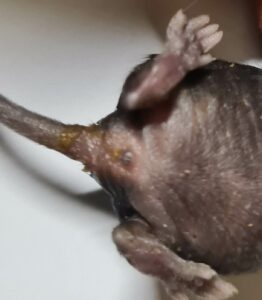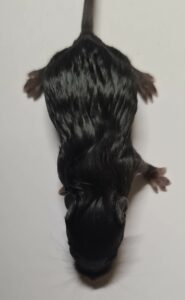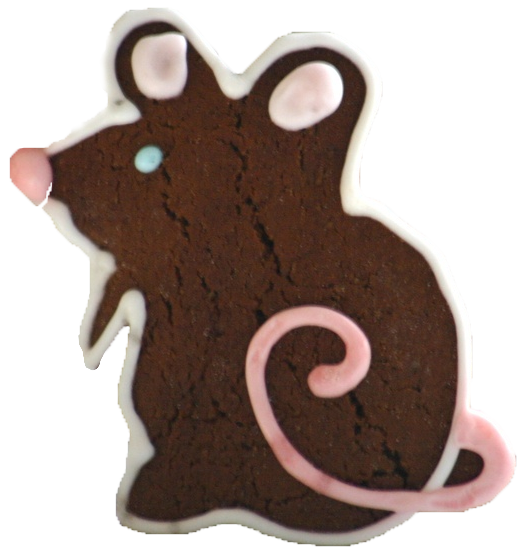A few years ago, and occasionally since, my mice suffered an outbreak of an illness that rapidly spread throughout the boxes. The main symptom was greasy, wet looking fur on suckling young. Most didn’t die but some did and they were certainly set back and/or stunted. It became a real head-
ache, ruining plans for litters to be ready for attendance and competing at shows.
I discussed the issue with many fanciers who were all aware of it and had various theories on what was commonly referred to as ‘the sweats’. Eventually I got fed up of the stress and disappointment and contacted a lab (cutting out the middleman, ie the vet and the vet’s prices) regarding having tests to identify the cause and hopefully provide a cure. Simple enough. You send off a faecal sample specifying what you want them tested for and a fee. The lab sends you the necessary bits for collecting and returning the sample.

Crusting around anus
It’s essential that you narrow down the likely cause based on symptoms otherwise you are likely to reap no results, just an invoice for your troubles. The symptoms presented were greasy fur on suckling young, bright yellow liquid stools and crusting around the anus and bloated bellies. The coats of the mothers also looked greasy and rough although they themselves were well. I requested tests for parasites, more out of curiosity, and then based on symptoms, for salmonella and rotavirus.

Greasy appearance
The results for parasites were negative. Also salmonella. Rotavirus, bingo, positive! As a virus, there is no cure, only management. It’s very common throughout mammal and bird species. It’s a big killer of third world infants but for the fortunate west we barely notice it. Just a quick bout of diarrhoea for our well nourished babies. It’s a problem for laboratory mouse populations and a vaccine has been produced, with limited success. Special cages with filter tops to prevent transmission as well as c-sections to stop mother/young cross contamination. However it is highly contagious and very difficult to eliminate. Adults with the virus show no symptoms. It is youngsters between 7 and 21 days that suffer. There is little to be done for the afflicted. Keep them clean and remove the crusting. Antibiotics will make things worse but a probiotic might help. By three weeks the strong will begin to recover and most will eventually grow on to be normal.
In my experience creams and anything with cream crossed into it are the most likely to succumb within the fancy. Presumably creams have low immunity.
There is good news; subsequent litters from the same parents are frequently unaffected. Ideally you should strive for stock with immunity but as always, these things are easier said than done. Due to the importance of laboratory mice in medical research there is much written about rotavirus.
So now you know the likely cause (and definite cause in my case) of your greasy litters you can look up the research and take comfort that you are not alone in your struggle.
Even the experts with all of the resources and facilities haven’t mastered this unpleasant virus.
 We use cookies to ensure that we give you the best experience on our website. If you continue to use this site we will assume that you are happy with it.
We use cookies to ensure that we give you the best experience on our website. If you continue to use this site we will assume that you are happy with it.
0 Comments